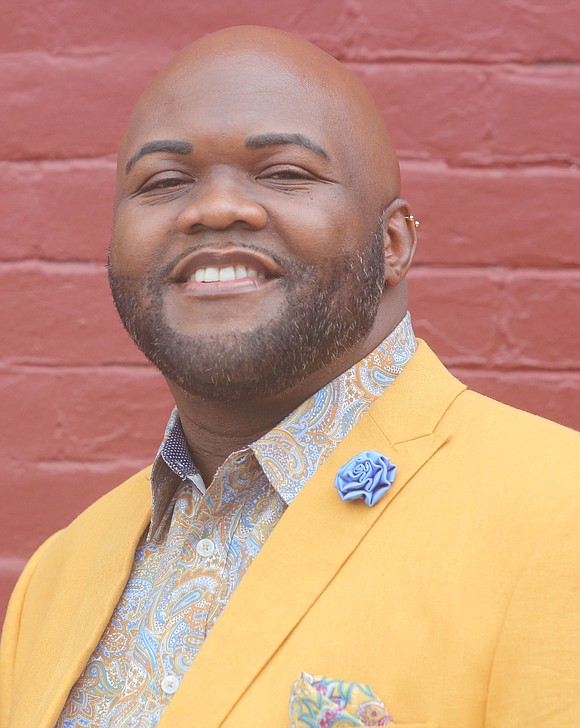VEA president learns a hard lesson about COVID-19
Ronald E. Carrington | 1/28/2021, 6 p.m.
Dr. James J. Fedderman is a career educator, but he’s learned more than he cares to know about COVID-19.
The first African-American man to serve as president of the 40,000-member Virginia Education Association is a coro- navirus survivor, but he is still recovering from his bout with the potentially deadly virus.
That’s why he’s pleading with VEA members and everyone else to wear a mask, maintain social distancing,
wash your hands and do everything that public health physicians and government officials are urging people do to protect themselves from the virus.
And he is urging public schools systems to take all precautions, including inoculations, before teachers and students are al- lowed to return to the classroom for in-person learning.
His message: Take the virus seriously; it is all too real.
Although Dr. Fedderman is no longer contagious, he said his recovery remains incomplete.
Still, the longtime music educator in Accomack County Public Schools on the Eastern Shore
is grateful he is increasingly able to complete his work and participate more actively with the VEA. He said he has learned his lesson on how easy it is to get COVID-19 from the people you love the most — your family.
Just a few days after a family gathering in mid-December, Dr. Fedderman said he tested positive for the coronavirus. That started a 19-day medical chain of events.
“I experienced things I never experienced before,” Dr. Freeman said in an interview. “Every day brought a new medical challenge.”
After being diagnosed as positive, Dr. Fedderman said he tried not to sleep because he didn’t know if he would wake up.
A divorced father of two children who lives alone, he said his journey with the disease began on Dec. 14, following the family get-together. He said two days later, he saw a doctor to get tested.
He said he developed shortness of breath and physical weakness. He was coughing, had chills and sweats, back pain and a loss of smell. His throat and ears were irritated, and he had headaches. He also began losing weight rapidly, about 30 pounds in two weeks.
“The only thing I could taste and desired were sour pickles,” Dr. Fedderman recalled.
His first tests came back negative. Concerned, he took a second, more accurate test.
On Friday, Dec. 18, he received a late-night call from his physician telling him that he had the virus. By Saturday, the local health department was calling to tell him he needed to remain in quarantine.
That day, he also learned that his sisters, Darlaine Watson and Gloria Fedderman, also had tested positive and were hunkered down in their respective homes.
Being in quarantine meant he could not call on his family for help, he said. In order to get by, he started using delivery services to get food and other supplies.
As his symptoms worsened, he contacted Tonya Martin, a close friend who is a school nurse and also works at Riverside Shore Memorial Hospital on the Eastern Shore. She took Dr. Fedderman to the hospital where he was treated for several days.
“That was a life-changing experience as the staff was attentive and worked on me,” he said.
He said he was a physically fragile African-American who had underlying conditions, including high blood pressure and Type 2 Diabetes, that put him at higher risk for complications from the virus.
The hospital staff, who know him from his work as a music educator and mentor, made him feel welcome and comfortable.
Following his hospital stay, “my life began to change as I began to bounce back and take control of my life. I started to feel a lot better,” he said.
Still, he said he struggles to balance himself when he stands up. He said quick movements make him unstable. He also has to be more disciplined in planning his time.
As he reflects on his experience, he is urging school boards, administrators, teachers and all involved in education to be cautious about reopening.
“It is very easy to stand at a podium and tell people what to do during this epidemic,” Dr. Fedderman said. “However,
it becomes a different story when you have experienced and lived through the coronavirus.”
He believes governing boards and school administrators should take a critical look to ensure that students and teachers can be fully protected before approving a return to in-person learning.
He said people making the decision need to ensure that the front line teachers are able to voice their cares and concerns, fears and feelings without worrying about retaliation.
“A lot of the calls to rush back are the result of reckless political pressures. School systems should be making the best decisions for students and teachers” based on the best scientific information, he said.
At the very least, he said, “Teachers should be vaccinated before in-person learning resumes. Until that can be accomplished, schools should remain virtual.”







